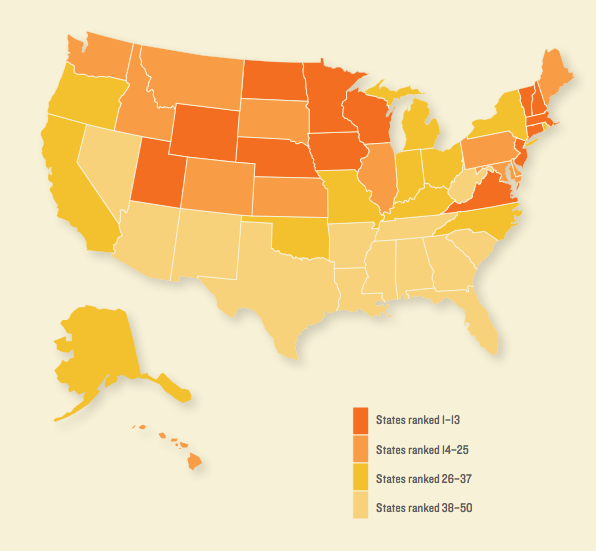 According to the Annie E. Casey Foundation's annual Kids Count Data Book, Texas ranked 43rd out of 50 for overall child well-being.
According to the Annie E. Casey Foundation's annual Kids Count Data Book, Texas ranked 43rd out of 50 for overall child well-being.Texas finds itself at the top of the list for a dubious distinction: it's tied as the state with the highest rate of uninsured children.
The finding is part of the Annie E. Casey Foundation’s new report this week that tracks statewide trends related to the well-being of children.
Texas, like many southern states, scored poorly in a variety of metrics. But it's the worst in the country (or, technically, tied with Alaska as worst-in-the-country), when it come to uninsured kids. Eleven percent of young Texans (about 784,000 children) lacked insurance in 2014, according to the study.
The report says that's an important metric, since kids without insurance are less likely than insured children to receive medical care when they need it. The foundation goes on to say insurance can protect families from financial devastation if a child suffers a serious medical condition. Most states have a rate of uninsured children less than half the Texas rate, according to the study.
The finding was part of the annual report called "Kids Count," based on the simple that idea that parents need well-paying jobs, affordable housing and an opportunity to invest in their kids' future.
The study found many states -- particular those in the south -- struggle to provide families with those basics.
Overall, the Lone Star State ranked 43 in the nonprofit's composite "child well-being" index, based on data compiled in four areas: economic well-being, education, health and family/community. The 10 worst-ranked states are all in the south or southwest.
Texas scored particularly poorly -- 47 -- in the family and community category, which includes data on the rate of children in single-parent homes; children in homes where parents' lack high school diplomas; children living in high-poverty areas; and the rate of teen births.
Poverty
The child poverty rate, the report says, has yet to return to pre-recession levels. Nationally, more than one in five children, or 22 percent, lives in poverty, according to estimates from the Census Bureau for 2014. These rates were much higher for African-American and Hispanic children at 38 percent and 32 percent respectively.
In Texas, the unemployment rate is relatively low, but child poverty rate in 2014 was 25 percent, slightly above the national average of 22 percent, according to the study. The Center for Public Policy Priorities, a left-leaning, Austin-based think tank notes the racial disparity inherent in that number. The child poverty rate was 33 percent and 32 percent for Hispanic and African-American children, respectively.
Overall, Texas ranked 33 in Annie E. Casey's measure of economic well-being.
Education
Texas also fared better than other southern and southwestern states in the national study's education index, raking 32. That figure is based on the rate of young children not in school; reading and math proficiency rates; and high school graduation rates. According to the CPPP, though, these numbers too differ by race, as illustrated by the chart below.
 Hispanic and African-American students are more likely to be enrolled in high-poverty districts than their white and Asian peers, according to the Center for Public Policy Priorities.
Hispanic and African-American students are more likely to be enrolled in high-poverty districts than their white and Asian peers, according to the Center for Public Policy Priorities.In some ways, the Kids Count report sounded a positive note, citing the growing number of children in the country with health insurance, increasing graduation rates and a decreasing number of teenagers with alcohol or drug abuse problems. But it also emphasized that work remains. "If we dig a little deeper," reads the report, "it quickly becomes clear that all is not well."
To read more from the national report, click here.

